- Home
- Nevil Shute
Pied Piper Page 3
Pied Piper Read online
Page 3
‘A lot of people say that the League has been a failure,’ he explained. ‘Now, I think that is very unfair. If you look at the record of that last twenty years you’ll see a record of achievement that no other organisation can show. Look at what the League did in the matter of the drug traffic!’ And so on.
About the war, he said: ‘The only failure that can be laid to the account of the League is its failure to inspire the nations with faith in its ideals. And that means propaganda. And propaganda costs money. If the nations had spent one-tenth of what they have spent in armaments upon the League, there would have been no war.’
After half an hour of this, old Howard came to the conclusion that Mr. Cavanagh was a tedious fellow. He bore with him from a natural politeness, and because the man was evidently genuine, but he made his escape as soon as he decently could. The extent of his sincerity was not made plain to Howard till the day he met Mrs. Cavanagh in the woods, and walked a mile back to the hotel with her.
He found her a devoted echo of her man. ‘Eustace would never leave the League,’ she said. ‘Even if the Germans were to enter Switzerland, he’d never leave Geneva. There’s still such great work to be done.’
The old man looked at her over his spectacles. ‘But would the Germans let him go on doing it if they got into Switzerland?’
‘Why, of course they would,’ she said. ‘The League is international. I know, of course, that Germany is no longer a member of the League. But she appreciates our non-political activities. The League prides itself that it could function equally well in any country, or under any government. If it could not do that, it couldn’t be said to be truly international, could it?’
‘No,’ said Howard, ‘I suppose it couldn’t.’
They walked on for a few steps in silence. ‘But if Geneva really were invaded by the Germans,’ he said at last, ‘would your husband stay there?’
‘Of course. It would be very disloyal if he didn’t.’ She paused, and then she said: ‘That’s why he sent me out here with the children, into France.’
She explained to him that they had no ties in England. For ten years they had lived in Geneva; both children had been born there. In that time they had seldom returned to England, even on holiday. It had barely occurred to them that she should take the children back to England, so far away from him. Cidoton, just across the border into France, was far enough.
‘It’s only just for a few weeks, until the situation clears a little,’ she said placidly. ‘Then we shall be able to go home.’ To her, Geneva was home.
He left her at the entrance to the hotel, but next day at déjeuner she smiled at him when he came into the room, and asked him if he had enjoyed his walk.
‘I went as far as the Pointe des Neiges,’ he said courteously. ‘It was delightful up there this morning, quite delightful.’
After that they often passed a word or two together, and he fell into the habit of sitting with her for a quarter of an hour each evening after dinner in the salon, drinking a cup of coffee. He got to know the children too.
There were two of them. Ronald was a dark-haired little boy of eight, whose toy train littered the floor of the salon with its tin lines. He was mechanical, and would stand fascinated at the garage door while the concierge laboured to induce ten-year-old spark-plugs to fire the mixture in the ten-year-old Chrysler. Old Howard came up behind him once.
‘Could you drive a car like that?’ he asked gently.
‘Mais oui—c’est facile, ça.’ French came more easily to this little boy than English. ‘You climb up in the seat and steer with the wheel.’
‘But could you start it?’
‘You just push the button, et elle va. That’s the ’lectric starter.’ He pointed to the knob.
‘That’s right. But it would be a very big car for you to manage.’
The child said: ‘Big cars are easier to drive than little ones. Have you got a car?’
Howard shook his head. ‘Not now. I used to have one.’
‘What sort was it?’
The old man looked down helplessly. ‘I really forget,’ he said. ‘I think it was a Standard.’
Ronald looked up at him, incredulous. ‘Don’t you remember?’
But Howard couldn’t.
The other child was Sheila, just five years old. Her drawings littered the floor of the salon; for the moment her life was filled with a passion for coloured chalks. Once as Howard came downstairs he found her sitting in a heap upon the landing at a turn of the staircase, drawing industriously on the fly-leaf of a book. The first tread of the flight served as a desk.
He stooped down by her. ‘What are you drawing?’
She did not answer.
‘Won’t you show me?’ he said. And then: ‘The chalks are lovely colours.’
He knelt down rheumatically upon one knee. ‘It looks like a lady.’
She looked up at him. ‘Lady with a dog,’ she said.
‘Where’s the dog?’ He looked at the smudged pastel streaks.
She was silent. ‘Shall I draw the dog, walking behind on a lead?’ he said.
She nodded vigorously. Howard bent to his task, his knees aching. But his hand had lost whatever cunning it might once have had, and his dog became a pig.
Sheila said: ‘Ladies don’t take pigs for a walk.’
His ready wit had not deserted the solicitor. ‘This one did,’ he said. ‘This is the little pig that went to market.’
The child pondered this. ‘Draw the little pig that stayed at home,’ she said, ‘and the little piggy eating roast beef.’ But Howard’s knees would stand no more of it. He stumbled to his feet. ‘I’ll do that for you to-morrow.’
It was only at that stage he realised that his picture of the lady leading a pig embellished the fly-leaf of A Child’s Life of Jesus.
Next day after déjeuner she was waiting for him in the hall. ‘Mummy said I might ask you if you wanted a sweet.’ She held up a grubby paper bag with a sticky mass in the bottom.
Howard said gravely: ‘Thank you very much.’ He fumbled in the bag and picked out a morsel which he put into his mouth. ‘Thank you, Sheila.’
She turned, and ran from him through the estaminet into the big kitchen of the inn. He heard her chattering in there in fluent French to Madame Lucard as she offered her sweets.
He turned, and Mrs. Cavanagh was on the stairs. The old man wiped his fingers furtively upon the handkerchief in his pocket. ‘They speak French beautifully,’ he said.
She smiled. ‘They do, don’t they? The little school they go to is French-speaking, of course.’
He said: ‘They just picked it up, I suppose?’
‘Oh yes. We didn’t have to teach it to them.’
He got to know the children slightly after that and passed the time of day with them whenever he met them alone; on their side they said: ‘Good morning, Mr. Howard,’ as if it was a lesson that they had been taught—which indeed it was. He would have liked to get to know them better, but he was shy, with the diffidence of age. He used to sit and watch them playing in the garden underneath the pine-trees sometimes, mysterious games that he would have liked to have known about, that touched dim chords of memory sixty years back. He did have one success with them, however.
As the sun grew warmer and the grass drier he took to sitting out in the garden after déjeuner for half an hour, in a deck-chair. He was sitting so one day while the children played among the trees. He watched them covertly. It seemed that they wanted to play a game they called attention which demanded a whistle, and they had no whistle.
The little boy said: ‘I can whistle with my mouth,’ and proceeded to demonstrate the art.
His sister pursed up her immature lips and produced only a wet splutter. From his deck-chair the old man spoke up suddenly.
‘I’ll make you a whistle, if you like,’ he said.
They were silent, staring at him doubtfully. ‘Would you like me to make you a whistle?’ he enquired.
‘When?’ asked Ronal
d.
‘Now. I’ll make you one out of a bit of that tree.’ He nodded to a hazel bush.
They stared at him, incredulous. He got up from his chair and cut a twig the thickness of his little finger from the bush. ‘Like this.’
He sat down again, and began to fashion a whistle with the pen-knife that he kept for scraping out his pipe. It was a trick that he had practised throughout his life, for John first and then for Enid when they had been children, more recently for little Martin Costello. The Cavanagh children stood by him watching his slow, wrinkled fingers as they worked; in their faces incredulity melted into interest. He stripped the bark from the twig, cut deftly with the little knife, and bound the bark back into place. He put it to his lips, and it gave out a shrill note.
They were delighted, and he gave it to the little girl. ‘You can whistle with your mouth,’ he said to Ronald, ‘but she can’t.’
‘Will you make me one to-morrow?’
‘All right, I’ll make you one to-morrow.’ They went off together, and whistled all over the hotel and through the village, till the bark crushed beneath the grip of a hot hand. But the whistle was still good for taking to bed, together with a Teddy and a doll called Mélanie.
‘It was so very kind of you to make that whistle for the children,’ Mrs. Cavanagh said that night, over coffee. ‘They were simply thrilled with it.’
‘Children always like a whistle, especially if they see it made,’ the old man said. It was one of the basic truths that he had learned in a long life, and he stated it simply.
‘They told me how quickly you made it’ she said. ‘You must have made a great many.’
‘Yes,’ he said, ‘I’ve made a good many whistles in my time.’ He fell into a reverie, thinking of all the whistles he had made for John and Enid, so many years ago, in the quiet garden of the house at Exeter. Enid who had grown up and married and gone to live in the United States. John who had grown up and gone into the Air Force. John.
He forced his mind back to the present. ‘I’m glad they liked it,’ he said. ‘I promised Ronald that I’d make him one to-morrow.’
To-morrow was the tenth of May. As the old man sat in his deck-chair beneath the trees carving a whistle for Ronald, German troops were pouring into Holland, beating down the Dutch Army. The Dutch Air Force was flinging its full strength of forty fighting planes against the Luftwaffe. A thousand traitors leapt into activity; all through the day the parachutists dropped from the sky. In Cidoton the only radio happened to be switched off, and so Howard whittled at his hazel twig in peace.
It did not break his peace much when they switched it on. In Cidoton the war seemed very far away; with Switzerland to insulate them from the Germans the village was able to view the war dispassionately. Belgium was being invaded again, as in the last war; the sale Boche! This time Holland, too, was in it; so many more to fight upon the side of France. Perhaps they would not penetrate into France at all this time, with Holland to be conquered and assimilated first.
In all this, Howard acquiesced. He could remember very clearly how the war had gone before. He had been in it for a short time, in the Yeomanry, but had been quickly invalided out with rheumatic fever. The cockpit of Europe would take the shock of the fighting as it usually did; there was nothing new in that. In Cidoton, it made no change. He listened to the news from time to time in a detached manner, without great interest. Presently fishing would begin; the snow was gone from the low levels and the mountain streams were running less violently each day.
The retreat from Brussels did not interest him much; it had all happened before. He felt a trace of disquiet when Abbeville was reached, but he was no great strategist, and did not realise all that was involved. He got his first great shock when Leopold, King of the Belgians, laid down his arms upon the 29th May. That had not happened in the last war, and it upset him.
But on that day nothing could upset him for very long. He was going fishing for the first time next morning, and the evening was occupied in sorting out his gear, soaking his casts and selecting flies. He walked six miles next day and caught three blue trout. He got back tired and happy at about six o’clock, had dinner, and went up immediately to bed. In that way he missed the first radio broadcasts of the evacuation of Dunkirk.
Next day he was jerked finally from his complacence. He sat by the radio in the estaminet for most of the day, distressed and worried. The gallant retreat from the beaches stirred him as nothing had for months; for the first time he began to feel a desire to return to England. He knew that if he went, there would be nothing for him to do, but he wanted to be back. He wanted to be in the thick of things again, seeing the British uniforms in the streets, sharing the tension and anxiety. Cidoton irked him with its rustic indifference to the war.
By the 4th June the last forces had left Dunkirk, Paris had had its one and only air-raid, and Howard had made up his mind. He admitted as much that night to Mrs. Cavanagh.
‘I don’t like the look of things at all,’ he said. ‘Not at all. I think I shall go home. At a time like this, a man’s place is in his own country.’
She looked at him, startled. ‘But surely, you’re not afraid that the Germans will come here, Mr. Howard? They couldn’t get as far as this.’ She smiled reassuringly.
‘No,’ he said, ‘they won’t get much farther than they are now. But at the same time, I think I shall go home.’ He paused, and then he said a little wistfully: ‘I might be able to get into the A.R.P.’
She knitted on quietly. ‘I shall miss having you to talk to in the evenings,’ she said. ‘The children will miss you, too.’
‘It has been a great pleasure to have known them,’ he said. ‘I shall miss them.’
She said: ‘Sheila enjoyed the little walk you took her for. She put the flowers in her tooth-mug.’
It was not the old man’s way to act precipitately, but he gave a week’s notice to Madame Lucard that night and planned to leave on the eleventh. He did it in the estaminet, and provoked a lively discussion on the ethics of his case, in which most of the village took part. At the end of an hour’s discussion, and a round of Pernod, the general opinion was favourable to him. It was hard on Madame Lucard to lose her best guest, the gendarme said, and sad for them to lose their English Camarade, but without doubt an old soldier should be in his own country in these times. Monsieur was very right. But he would return, perhaps?
Howard said that he hoped to return within a very few weeks, when the dangerous stage of the war had passed.
Next day he began to prepare for his journey. He did not hurry over it because he meant to stay his week out. In fact, he had another day’s fishing and caught another two blue trout. There was a lull in the fighting for a few days after the evacuation from Dunkirk and he went through a day of indecision, but then the Germans thrust again upon the Somme and he went on preparing to go home.
On the ninth of June Cavanagh appeared, having driven unexpectedly from Geneva in his little car. He seemed more worried and distrait than usual, and vanished into the bedroom with his wife. The children were sent out to play in the garden.
An hour later he tapped upon the door of Howard’s bedroom. The old man had been reading in a chair and had dropped asleep, the book idle on his lap. He woke at the second tap, settled his spectacles, and said: ‘Come in!’
He stared with surprise at his visitor, and got up. ‘This is a great pleasure,’ he said formally. ‘But what brings you out here in the middle of the week? Have you got a holiday?’
Cavanagh seemed a little dashed. ‘I’ve taken a day off,’ he said after a moment. ‘May I come in?’
‘By all means.’ The old man bustled round and cleared a heap of books from the only other chair in the room. Then he offered his guest a cigarette. ‘Won’t you sit down?’
The other sat down diffidently. ‘What do you think of the war?’ he asked.
Howard said: ‘I think it very serious. I don’t like the news at all.’
‘Nor
do I. I hear you’re going home?’
‘Yes, I’m going back to England. I feel that at a time like this my place is there.’
There was a short silence. Then Cavanagh said: ‘In Geneva we think that Switzerland will be invaded.’
Howard looked at him with interest. ‘Do you, now! Is that going to be the next thing?’
‘I think so. I think that it may happen very soon.’
There was a pause. Then Howard said: ‘If that happened, what would you do?’
The little sandy-haired man from Geneva got up and walked over to the window. He stood for a moment looking out over the meadows and the pinewoods. Then he turned back into the room. ‘I should have to stay in Geneva,’ he said. ‘I’ve got my work to do.’
‘Would that be very—wise?’
‘No,’ said Cavanagh frankly. ‘But it’s what I have made up my mind to do.’
He came back and sat down again. ‘I’ve been talking it over with Felicity,’ he said. ‘I’ve got to stay there. Even in German occupation there would still be work for us to do. It’s not going to be pleasant. It’s not going to be profitable. But it’s going to be worth doing.’
‘Would the Germans allow the League to function at all?’
‘We have positive assurances that they will.’
‘What does your wife think about it?’ asked Howard. ‘She thinks that it’s the proper thing to do. She wants to come back to Geneva with me.’
‘Oh …’
The other turned to him. ‘It’s really about that that I looked in to see you,’ he said. ‘If we do that, things may go hardly with us before the war is over. If the Allies win they’ll win by the blockade. There won’t be much to eat in any German territory.’
Howard stared at the little man in wonder. ‘I suppose not.’ He had not credited Cavanagh with such cool courage.
‘It’s the children.’ the other said apologetically. ‘We were thinking—Felicity was wondering … if you could possibly take them back to England with you, when you go.’
He went on hurriedly, before Howard could speak: ‘It’s only just to take them to my sister’s house in Oxford, up on Boars Hill. As a matter of fact, I could send her a telegram and she could meet you at Southampton with the car, and drive them straight to Oxford. It’s asking an awful lot, I’m afraid. If you feel you couldn’t manage it … we’ll understand.’

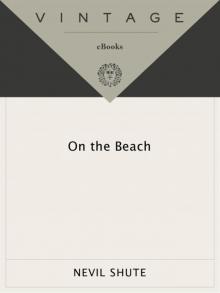 On the Beach
On the Beach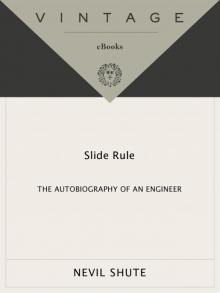 Slide Rule
Slide Rule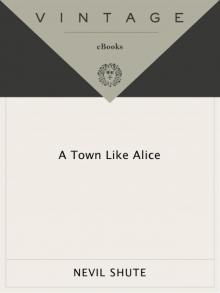 A Town Like Alice
A Town Like Alice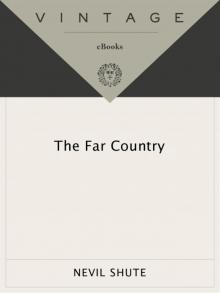 The Far Country
The Far Country Pied Piper
Pied Piper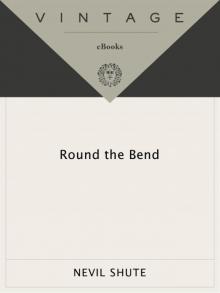 Round the Bend
Round the Bend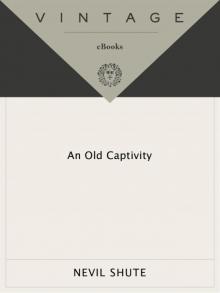 An Old Captivity
An Old Captivity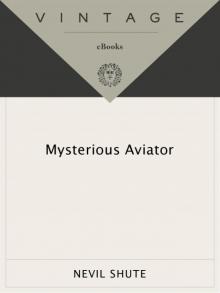 Mysterious Aviator
Mysterious Aviator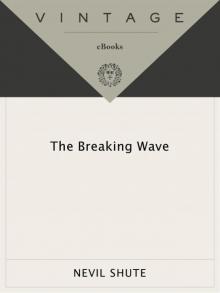 The Breaking Wave
The Breaking Wave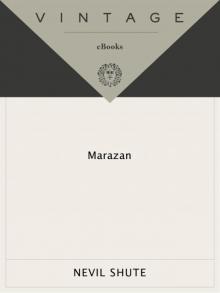 Marazan
Marazan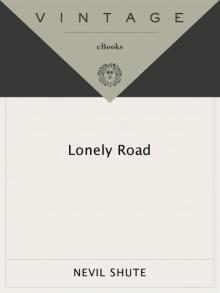 Lonely Road
Lonely Road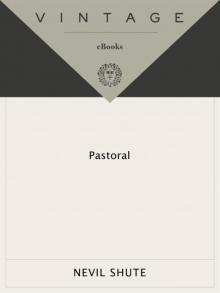 Pastoral
Pastoral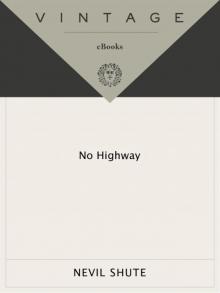 No Highway
No Highway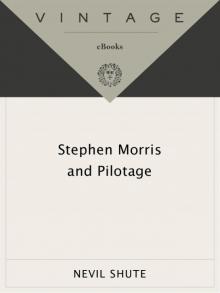 Stephen Morris and Pilotage
Stephen Morris and Pilotage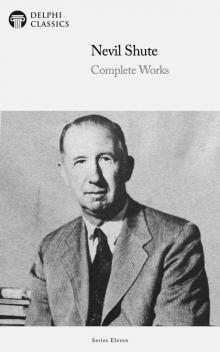 Complete Works of Nevil Shute
Complete Works of Nevil Shute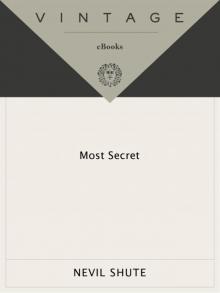 Most Secret
Most Secret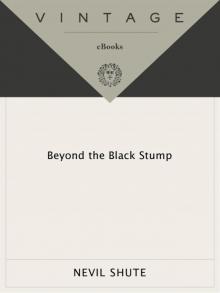 Beyond the Black Stump
Beyond the Black Stump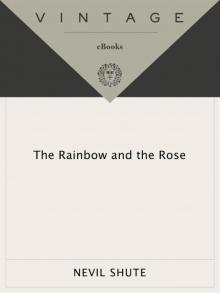 The Rainbow and the Rose
The Rainbow and the Rose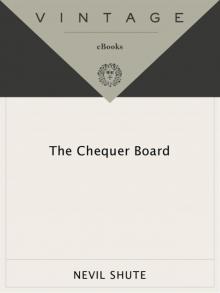 The Chequer Board
The Chequer Board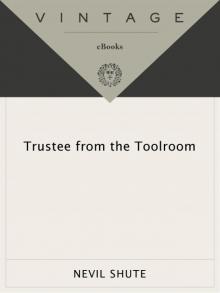 Trustee From the Toolroom
Trustee From the Toolroom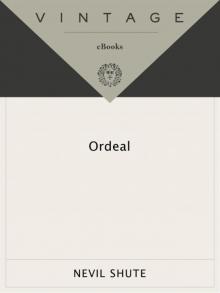 Ordeal
Ordeal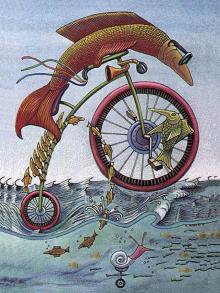 Stephen Morris
Stephen Morris